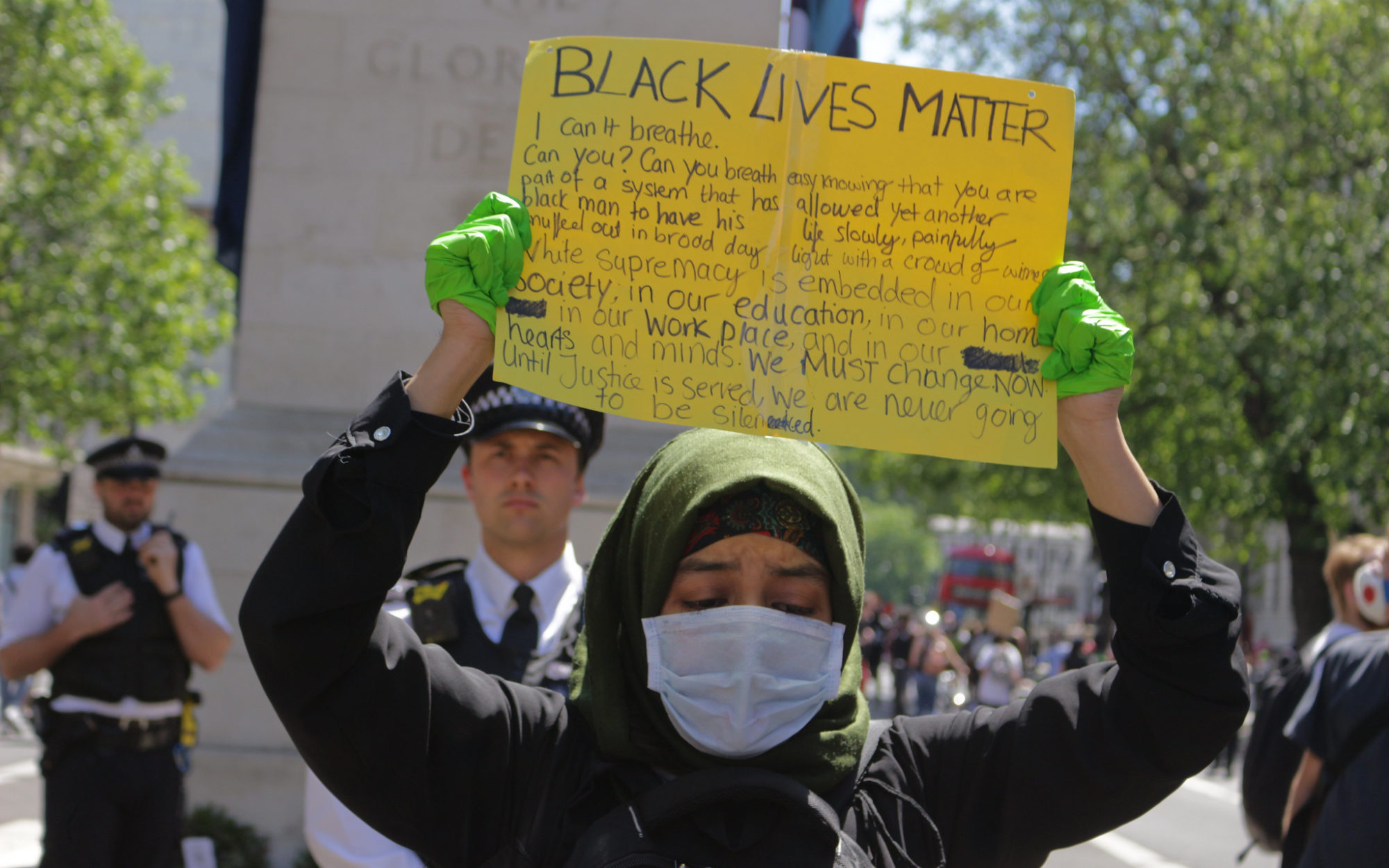The death of George Floyd during the Covid pandemic has had global significance and sparked worldwide protest. Andre L Ryan asks how Black Lives Matter supporters can turn this moment into a movement that lasts far beyond the pandemic.
The world bore witness for 8 minutes and 46 seconds of a human being’s last moments on this earth. “Please, I can’t breathe,” George Floyd begged, as Derek Chauvin of the Minneapolis Police Department, knelt upon his neck. The reason for George Floyd’s death, it seems, was simply that he was Black and poor. So it rightly follows that there is much pain and frustration, with young and old, Black and white, around the world, coming together in solidarity to protest against a brutal killing. The death of George Floyd has sent shockwaves to the consciousness of the masses.
But sadly, the circumstances in which George Floyd died are nothing new. Both here in the UK and in the US, the death of Black men in police custody is a scarily all-too-casual pattern. The deaths of Christopher Alder (1998, UK), Sean Rigg (2008, UK), Eric Garner (2014, US) and Freddie Gray (2015, US), to name a few, serve to remind us of the reality of the situation. Black men dying in police custody has become habitual and, to some degree or another, socially tolerated.
The reason why George Floyd’s death is different; the reason why it is resonating with so many people beyond the Black community, is because in “the new normal” of these Covid-19 times we have all become aware of our own vulnerabilities.
And how despite living in a society that favours individualism, this global crisis has made us aware that we all dependent on each other. Communities and caring is what’s getting the majority of us through this.
Read more: Why the sight of brave, exhausted George Floyd protesters gives me hope
George Floyd’s death has sent shockwaves to the masses because many of us recognise he could be the delivery driver who brought us essentials when our cupboards were running low; the carer who spent the last days with our elderly loved ones providing comfort and compassion; the cleaner keeping our streets, transport and schools clean and safe. George Floyd is not just another Black man who died in police custody; he could be a part of our community. And for many, that’s what makes him a part of us.
It is for these reasons that the protests are so important. If we are truly to live by the values of democracy, freedom of speech and expression must be allowed to flourish. Though these protests will not bring George Floyd back, they represent the first steps towards healing and addressing the issue. Civil disobedience represents the first step to achieving answers and closure. As citizens of democracies, we are afforded this privilege that persons in non-democracies are not.
If the state refuses to recognise the dignity and humanity of the citizens who have given it consent to govern, it becomes the citizen’s civic duty through peaceful protest to make it listen, and to ask for the bargain to be fully upheld.
As Martin Luther King Jr put it in his 1967 speech, The Other America, delivered at Stanford University, when riotous activities occur such as the damage or destruction of property, as we have seen in the case of statues during Black Lives Matter protests, such acts are “socially self-destructive and self-defeating” in that they’re liable to “create more social problems than they will solve”.
However Martin Luther King Jr went on to say, “a riot is the language of the unheard”, finding “social justice and progress are the absolute guarantors of riot prevention.”
Read more: Coronavirus reminds us that America doesn’t like Black people
For all of those who believe in social justice, equality and fairness, this is a chance to make a real difference. This could be a generational turning point.
To quote Hamilton: “This is not a moment, it’s a movement.” There is light out of this dark tunnel; something good can come out of something so bad. When the economic downturn kicks in and pockets feel the pinch, we must try not to forget that we are more similar than we are different.
We must try to resist the politics of hate and division and challenge it with understanding and compassion. We must try not forget, our shared sense of community, humanity and vulnerability.
Putting politics aside and focusing on the message, Black Lives Matter because human life matters. This is what we can learn from the death of George Floyd and all those who have died in similar circumstances. This is how we can challenge systemic racial inequality and unjust discrimination in the police and in any other institution where it lies.
The killing of George Floyd attacks human dignity. It attacks us all. So, let’s ask ourselves, how can we remember this when the protests fade away? How can we make sure George Floyd’s death was not in vain? How can we turn this time of global crisis into a global triumph? How do we treat each other, when this event comes to pass?”
Main image taken at the George Floyd Black Lives Matter protest in London on May 31 2020 – by Steve Eason.
